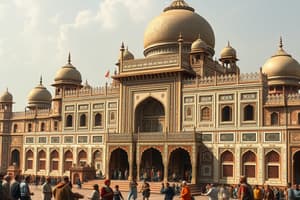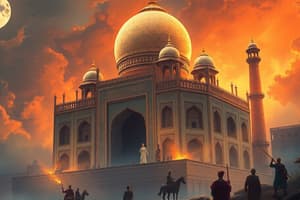Podcast
Questions and Answers
What was a primary cause of dissatisfaction among Indians prior to the War of Independence?
What was a primary cause of dissatisfaction among Indians prior to the War of Independence?
- The popularity of British educational policies
- The British assistance in local governance
- The success of Indian troops in gaining territory
- The introduction of the Enfield Rifle (correct)
Which event is considered the immediate cause that triggered the War of Independence in 1857?
Which event is considered the immediate cause that triggered the War of Independence in 1857?
- The execution of local freedom fighters
- The British imposition of new taxes
- The arrest of leaders by the British
- Mangal Pandey's rebellion against greased cartridges (correct)
What significant aspect of the War of Independence was highlighted by the collaboration of different religious groups?
What significant aspect of the War of Independence was highlighted by the collaboration of different religious groups?
- Muslims and Hindus united for the first time against foreign rule (correct)
- Unity was mainly between Sikhs and British forces
- Only Hindu troops participated in the uprising
- Religious differences intensified the conflict
In which areas did the War of Independence primarily take place?
In which areas did the War of Independence primarily take place?
What led to the perception of British rule being increasingly oppressive in India during the 1850s?
What led to the perception of British rule being increasingly oppressive in India during the 1850s?
Which of the following was NOT a cause of the War of Independence?
Which of the following was NOT a cause of the War of Independence?
What action was taken against Mangal Pandey after he opposed the British commands?
What action was taken against Mangal Pandey after he opposed the British commands?
What underlying issue regarding British policies contributed to the uprising in 1857?
What underlying issue regarding British policies contributed to the uprising in 1857?
What was the primary reason for the uprising among the sepoys in early 1857?
What was the primary reason for the uprising among the sepoys in early 1857?
Who was executed after openly resisting his British officer?
Who was executed after openly resisting his British officer?
Which factor significantly contributed to the failure of the uprising?
Which factor significantly contributed to the failure of the uprising?
Who became a symbol of unity between the Hindus and Muslims during the uprising?
Who became a symbol of unity between the Hindus and Muslims during the uprising?
What was one of the significant locations the British managed to regain control over by September 1857?
What was one of the significant locations the British managed to regain control over by September 1857?
What critical disadvantage did the sepoys face compared to the British forces?
What critical disadvantage did the sepoys face compared to the British forces?
What was the outcome for Bahadur Shah II following the suppression of the uprising?
What was the outcome for Bahadur Shah II following the suppression of the uprising?
What officially ended the uprising by August 1858?
What officially ended the uprising by August 1858?
What was a significant consequence of the British victory in the Battle of Plassey?
What was a significant consequence of the British victory in the Battle of Plassey?
Which factor contributed to the inefficiency of the Mughal army?
Which factor contributed to the inefficiency of the Mughal army?
How did the arrival of the British impact the Mughal Empire?
How did the arrival of the British impact the Mughal Empire?
What was a primary issue that led to the decline of the jagirdari system?
What was a primary issue that led to the decline of the jagirdari system?
What was the result of Nadir Shah's invasion of the Mughal Empire?
What was the result of Nadir Shah's invasion of the Mughal Empire?
What problem did the size of the Mughal Empire create?
What problem did the size of the Mughal Empire create?
What was one reason for the demoralization of the Mughal army?
What was one reason for the demoralization of the Mughal army?
What phase of the Mughal Empire's decline began after Bahadur Shah I's death?
What phase of the Mughal Empire's decline began after Bahadur Shah I's death?
What was a significant reason for the failure of the rebellion led by Bahadur Shah Zafar?
What was a significant reason for the failure of the rebellion led by Bahadur Shah Zafar?
Which factor contributed to the British strength during the conflict?
Which factor contributed to the British strength during the conflict?
Who was declared the leader by the Indian soldiers during the rebellion?
Who was declared the leader by the Indian soldiers during the rebellion?
What was one of the economic conditions faced by Indian soldiers at the time of rebellion?
What was one of the economic conditions faced by Indian soldiers at the time of rebellion?
What mistaken belief did the soldiers hold about their chosen leader, Bahadur Shah Zafar?
What mistaken belief did the soldiers hold about their chosen leader, Bahadur Shah Zafar?
Which of the following statements describes the political stance of many state rulers during the war of 1857?
Which of the following statements describes the political stance of many state rulers during the war of 1857?
What was a significant impact on Indian Muslims after the war of independence?
What was a significant impact on Indian Muslims after the war of independence?
Which aspect did the rebellion lack that was evident in the British forces?
Which aspect did the rebellion lack that was evident in the British forces?
What event is regarded as the beginning of the decline of the Mughal Empire?
What event is regarded as the beginning of the decline of the Mughal Empire?
Which policy of Aurangzeb contributed significantly to the loss of loyalty among his subjects?
Which policy of Aurangzeb contributed significantly to the loss of loyalty among his subjects?
What character trait was commonly observed among the successors of Aurangzeb?
What character trait was commonly observed among the successors of Aurangzeb?
What was a significant consequence of the absence of a definite law of appointment in the Mughal Empire?
What was a significant consequence of the absence of a definite law of appointment in the Mughal Empire?
How did the character of the nobles change over time according to the content?
How did the character of the nobles change over time according to the content?
Which event is commonly linked to the growing weakness of the Mughal Empire in the 18th century?
Which event is commonly linked to the growing weakness of the Mughal Empire in the 18th century?
What contributed to the moral degeneration of the Mughal nobles?
What contributed to the moral degeneration of the Mughal nobles?
Which of the following factors is NOT listed as a cause for the fall of the Mughal Empire?
Which of the following factors is NOT listed as a cause for the fall of the Mughal Empire?
Flashcards are hidden until you start studying
Study Notes
The Decline of the Mughal Empire
- The death of Aurangzeb Alamgir in 1707 marked the beginning of the Mughal Empire's decline.
- Aurangzeb's policies, including his religious bigotry, alienated many subjects and led to revolts by groups like the Jats, Satnamis, and Sikhs.
- Aurangzeb's successor's weakness and lack of leadership contributed to the empire's downfall.
- The absence of a clear succession law led to power struggles and weakened the central authority.
- Moral degeneration among the nobles with corruption and self-interest undermining the government.
- The Battle of Plassey in 1757 marked the beginning of British dominance in India.
- The Mughal army had become inefficient, ill-equipped, and lacking in discipline contributing to their decline.
- The Mughal's lack of focus on scientific education and naval power allowed European powers to gain control.
- The vast size of the Mughal Empire made it difficult to manage effectively.
- The arrival of the British East India Company and their increasing power eventually led to the Mughal Empire's downfall.
- Nadir Shah's invasion in 1739 brought significant humiliation and economic damage to the Mughal Empire.
- The failure of the jagirdari system caused financial instability, leading to a drain on the Mughal treasury.
- After the 1857 rebellion, the British formally assumed control of India, ending the Mughal Empire.
The War of Independence (1857)
- The war of independence was a result of growing discontent among Indians towards British rule.
- The immediate cause of the uprising was the introduction of greased cartridges for the Enfield rifle, which were considered offensive to both Hindus and Muslims.
- Mangal Pandey's resistance to the cartridges in 1857 sparked the initial events leading to the mutiny.
- The war spread across several regions, including Meerut, Delhi, Kanpur, and Lucknow.
- Bahadur Shah II, the last Mughal emperor, became a symbol of unity for the rebels.
- The British regained control over Lucknow and Delhi by 1857, leading to Bahadur Shah II's surrender.
- Lakshmibai, the Rani of Jhansi, was killed in battle in 1858.
- The uprising was officially declared over in 1858.
Reasons for Failure of the 1857 Revolt
- The rebellion was poorly planned and lacked a unified strategy.
- Lack of communication among rebel groups hindered coordinated efforts and left them vulnerable to British troops.
- The rebels lacked modern weaponry and military training, making it difficult to compete against the British forces.
- The rebellion was primarily led by soldiers with limited experience and a divided leadership structure.
- The economic instability of the rebels, coupled with Bahadur Shah II's lack of resources, limited their ability to sustain the fight.
- Many Indian rulers, fearing the loss of their power, sided with the British.
British Strength during the 1857 Revolt
- The British had conquered Punjab and Sindh, ensuring limited support for rebels from those regions.
- The British had superior weaponry and military training, giving them a significant advantage.
- The British leadership, more experienced and unified, successfully countered the rebel forces.
Impacts of the War of Independence (1857)
- Muslims, who played a significant role in the uprising, were viewed as primarily responsible.
- The war had a profound impact on the socio-political and economic lives of Muslims in India.
- The war of independence proved that the British rule faced strong resistance, marking a turning point in the struggle for independence in India.
Studying That Suits You
Use AI to generate personalized quizzes and flashcards to suit your learning preferences.




